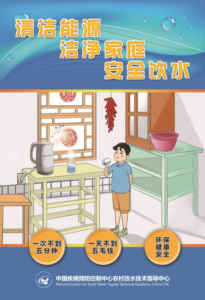Electric Kettle Promotion Program in Rural China (RCT)
 Results from our previous research in rural China suggests that increasing the use of electric kettles for boiling (i.e., treating) drinking water in low-income areas of rural China could help expand access to safer drinking water, reduce household air pollution, and improve environmental and health outcomes in rural Chinese households currently boiling drinking water with solid-fuels (or not treating their water, or drinking contaminated bottled water). Our study was designed (and pre-registered on Chinese Clinical Trials Register & ClinicalTrials.gov) to evaluate the impact of a pilot Rural Electric Kettle Promotion Program offered to low-income households in rural Anhui Province, China. Specifically, we used a parallel arm cohort cluster-randomized controlled (RCT) trial design with a 1:1 ratio to randomize 30 villages (i.e., clusters) to treatment or control using stratified randomization by geography and by cluster proportions of reported electric kettle use at baseline (900 households total).
Results from our previous research in rural China suggests that increasing the use of electric kettles for boiling (i.e., treating) drinking water in low-income areas of rural China could help expand access to safer drinking water, reduce household air pollution, and improve environmental and health outcomes in rural Chinese households currently boiling drinking water with solid-fuels (or not treating their water, or drinking contaminated bottled water). Our study was designed (and pre-registered on Chinese Clinical Trials Register & ClinicalTrials.gov) to evaluate the impact of a pilot Rural Electric Kettle Promotion Program offered to low-income households in rural Anhui Province, China. Specifically, we used a parallel arm cohort cluster-randomized controlled (RCT) trial design with a 1:1 ratio to randomize 30 villages (i.e., clusters) to treatment or control using stratified randomization by geography and by cluster proportions of reported electric kettle use at baseline (900 households total).
[Notes: We pre-specified and pre-registered our statistical analysis plan, but data cleaning and analysis were significantly delayed due to the COVID19 pandemic; we anticipate publishing primary findings starting in 2026]
